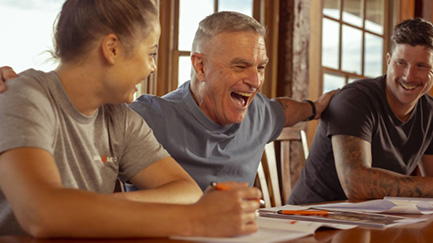
How to exercise your resilience muscle
While change is an inevitable part of life, it can sometimes stir up feelings of uncertainty. By understanding how we respond to change, we can strengthen our ability to cope and become more resilient.

Sleep is the great reset. It helps to restore the body, support brain functions, aid in muscle repair and immune function, emotional regulation, and metabolic balance. Basically, what doesn’t it do?
Explaining the sleep cycle
The sleep cycle can be divided into four stages, consisting of different aspects of REM (rapid eye movement) and non-REM sleep, and cycling through all of these stages every 90 minutes.
So, what are the stages of the sleep cycle?
Over the course of an 8-hour sleep, you will go through more stages of non-REM sleep, with brief cycles of REM sleep in the first half of your sleep, with progressively more frequent cycles of REM sleep as you move towards waking up.
Sleep health and its effects
‘Sleep health’ is a term that encompasses things like sleep quality, duration, and consistency of sleep, which supports a person’s overall health and wellbeing. It can include other factors such as sleep efficiency (time in bed vs. total sleep time) and the depth of sleep.
Sleep efficiency is a great indicator of a person’s sleep health, as better sleep health would see the total time in bed be close to the total time of sleep.
Poor sleep health can disrupt the natural sleep cycle. Poor sleep health may refer to irregular sleep times, stress, insomnia, frequent nightmares, or excessive screen exposure before sleeping, all of which can impact the natural sleep cycle.
A major contributor to poor sleep health in veterans is sleep apnoea. Veterans experience a higher rate of sleep apnoea than the civilian population. It is important to see your GP to assess for this or other medical causes of sleep disruption.
Poor sleep cycles can result in feelings of anxiety, stress, pain problems, and lethargy throughout the day. Sleep health, and a good sleep, is integral to managing physical pain, mental health concerns, and boosting energy levels.
How to regulate your sleep cycle
Regulating your sleep cycle is imperative to good overall health and wellbeing. The first step to helping improve your sleep is evaluating what is getting in the way of getting a good sleep.
Some general tips for a good sleep include:
One of the most important tips is that if you struggle to fall asleep within 20 – 30 minutes of getting into bed, change your environment! Remove yourself from your bedroom and do something quiet and calming until you feel tired, whether this is reading a book in lowlight, or journalling, before heading back to bed.
The reason this may happen is the brain loves to pair things together: if you consistently struggle to fall asleep, the brain will pair bedtime with worry time.
If sleep is a cause of concern for you, consult a psychologist to help determine your barriers to a good sleep.
Support at Mates4Mates
At Mates4Mates, we understand that sleep may be difficult for veterans for various reasons including PTSD, neurological damage, physical injuries and more.
Mates4Mates offers veterans and families access to mental health services, including in-person and telehealth appointments with psychologists who are trained in cognitive behavioural therapy for insomnia.
The Mates4Mates Online Sleep Program is also available multiple times throughout the year and aims to teach veterans and family members skills and strategies for improved sleep, as well as explore and understand sleep from a physiological, psychological and practical perspective.
To find out more about how Mates4Mates services can help improve your sleep, reach out to Mates4Mates on 1300 4 MATES (62 837) for a confidential chat.
Written by Jonathan Moscrop, Mates4Mates Psychologist
The Mates4Mates Online Sleep Program is proudly sponsored by the team at Sleepy's.

While change is an inevitable part of life, it can sometimes stir up feelings of uncertainty. By understanding how we respond to change, we can strengthen our ability to cope and become more resilient.